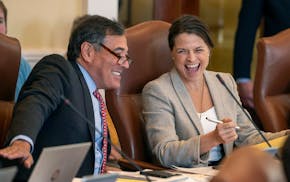Republicans and their campaign allies, often financially outmatched in recent years by a cash-rich DFL machine, focused their resources on a relatively small number of key and expensive state House races and the gamble paid off, according to campaign finance reports made public Tuesday.
The reports show that of the 10 most expensive statehouse races in 2014, Republicans won seven — the exact number they needed to take the majority, plus four others for good measure. The price tag on a couple of those races topped $750,000 in independent expenditures alone, not counting what the candidates themselves spent.
The DFL retained its overall fundraising advantage, with Democratic-aligned groups spending $10 million to the approximate $6 million of their Republican counterparts, but the data does not show so-called dark money spending by groups that do not have to report expenses, which is where Republicans may be catching up or surpassing Democrats.
All told, the parties, candidates and political action committees spent an estimated $66 million on the 2014 contests.
Republican-aligned groups spent $1.26 million to help GOP gubernatorial nominee Jeff Johnson, who trailed in the polls from the day he won his primary, while DFL groups spent $4.5 million to help re-elect Gov. Mark Dayton, swamping Johnson with negative ads before he could get his campaign off the ground.
In the House races, however, Republicans and their allies approached parity, spending $4.3 million to the DFL aligned groups' $5.4 million. The Republican-leaning Minnesota Jobs Coalition, for instance, funneled at least $325,000 from the Washington, D.C.-based Republican State Leadership Committee into targeted races that helped put House Republicans over the top. Ben Golnik was hired away from the Jobs Coalition after November's election to the House Republicans' top staff job..
Some money not tracked
Although $66 million was reported spent in 2014, what's not known is precisely how much was spent by so-called dark money groups — nonprofit organizations that can spend unlimited sums on elections without disclosing their donors. They have become much more active in politics since the U.S. Supreme Court 2010 Citizens United decision gutted campaign finance rules. Minnesota House Democrats complain bitterly about this spending and have offered legislation this year attempting to close loopholes.
In the governor's race, Dayton raised $3.39 million and spent $3.47 million. He raised $209,000 after Oct. 21 through the end of the year and spent about $513,000. Johnson raised nearly $2.5 million and spent about the same. He raised $263,000 in the stretch after Oct. 21, and spent about $663,000.
Cheap race by comparison
Overall, the Minnesota governor's race remained relatively cheap. Total spending in the Wisconsin governor's race, between GOP Gov. Scott Walker and challenger Mary Burke, likely topped $60 million, according to the Wisconsin Center for Investigative Journalism.
Traditional DFL allies helped
Minnesota DFLers were helped by reliable allies: The Alliance for a Better Minnesota Action Fund spent more than $4.5 million. Big labor union PACs also pitched in, including Education Minnesota with more than $400,000 and big totals from AFSCME, SEIU and the nurses union also came to the DFL's aid. This was in addition to nearly $2.9 million by the state party and more than $900,000 by the DFL House caucus.
On the Republican side, the party spent $1.3 million. Minnesota Action Network, with which former Sen. Norm Coleman is affiliated, spent $657,000; Pro Jobs Majority spent more than $1 million, with several similar, business-backed groups chipping in six-figure chunks. The House Republican caucus spent $440,000.
The state Republican Party's liabilities were $1.54 million at the end of 2014.
A nearly million-dollar race
The state's most expensive state House race saw first-term DFL Rep. Zach Dorholt losing to Jim Knoblach, a one-time veteran legislator returning to state politics after stepping down in 2006, after forces on both sides spent a chart-topping $972,000. Of that, the DFL candidate and aligned groups spent $506,000 while GOP groups and Knoblach spent $466,000. Knoblach, now chairman of the House Ways and Means Committee, won by 69 votes out of more than 11,000 cast.
In most of the costliest races, Republicans won despite being narrowly outspent by Democrats.
Patrick Coolican • 651-925-5042
Former Wisconsin Democratic Rep. Peter Barca announces new bid for Congress
The Latest | Jury selection enters a pivotal stretch as Trump's hush money trial resumes

